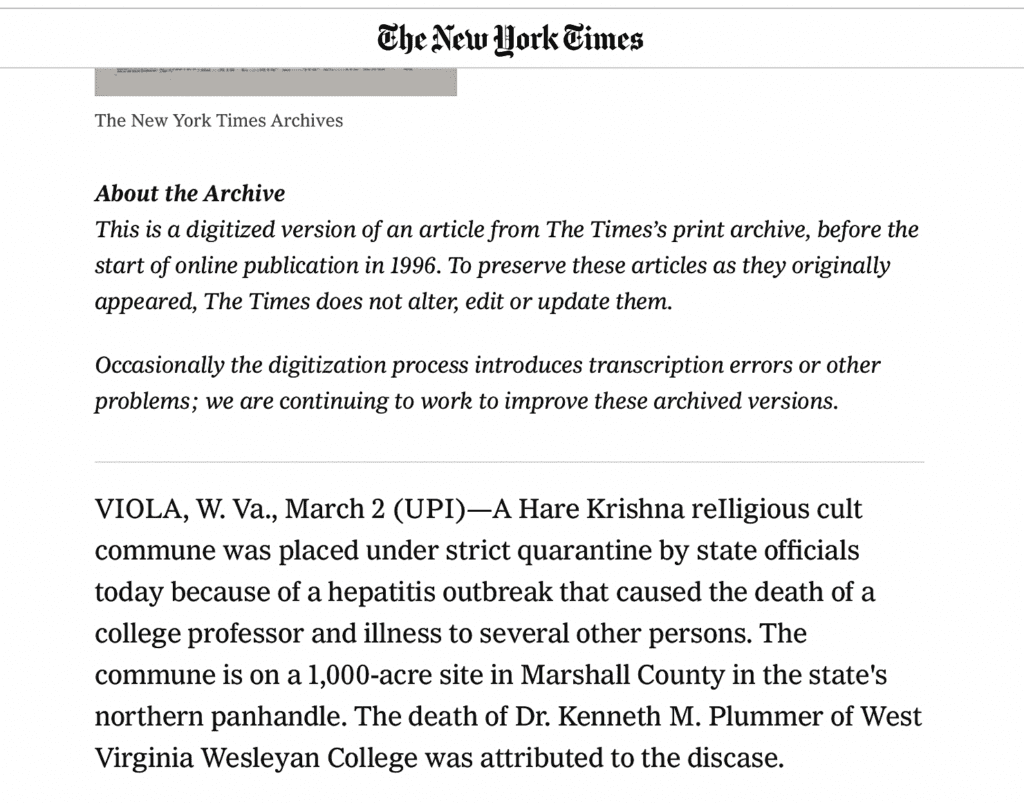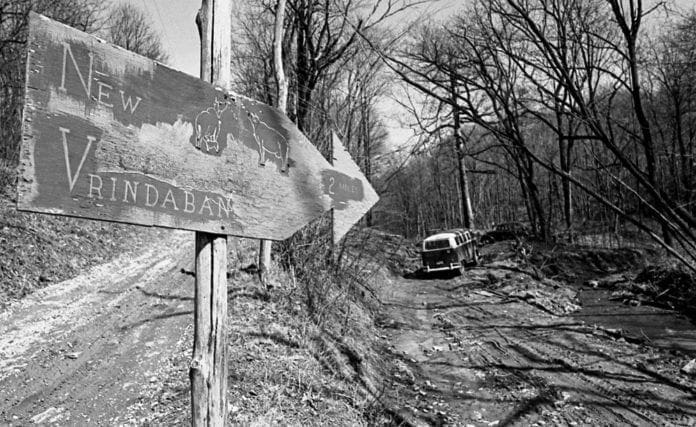Road blocks, swirling cruiser lights, and law enforcement standing firm.
No one in, and no one out.
It’s happened here, and it took place in Marshall County. Deputies with the county’s Sheriff’s Office partnered with troopers with the W.Va. State Police to close it off. For a few weeks, that was life on the inside of New Vrindaban, and on the outside, too, for residents in the nearby Limestone and Sand Hill communities.
A hepatitis outbreak had taken place in late February 1976, only after a few years the Hare Krishna community established the settlement. Once arriving to the area, the original members secured a land-purchase agreement with local farmer Richard Rose, and the construction on a new home for followers of the Krishna consciousness began immediately.

“It wasn’t long after they started building on that land when that happened,” recalled John Gruzinksas, currently a Marshall County commissioner and a 30-plus-year veteran of law enforcement. “It was an outbreak of hepatitis, and the county health department found out about it, so the best thing for the people of the county was to close it off.
“People were making sure they had everything that they needed, so it’s not like it was locked down with no assistance,” he recalled. “But, at that time, it was really important they didn’t go out into the surrounding areas because of how contagious it was thought to be.”

Immediate Intel
Today, the medical world recognizes three types of hepatitis, A, B. and C., but those classifications were not as defined. Very soon after Gruzinksas reported for his Moundsville assignment with the W.Va. State Police, his superiors sat him down and took him on the tour.
“I didn’t get assigned to Moundsville until late in 1977, so I wasn’t in the area yet,” Gruzinksas said. “But New Vrindaban was definitely one of the things the veterans told me about when I arrived. They took me up there so I would know where it was.
“I do know they got a lot of help from the county health department, and they took care of themselves, too,” he explained. “This quarantine took place well before all of the trouble started up there, but the veterans did tell me about some stuff about them usually skirted the law. They were just went about things the way they wanted to and state officials didn’t seem to care much.”
The troubles of New Vrindaban have been chronicled by the international media and book writers, all of which tell the tales of the corruption, the infusion of troublemaking “fridgies,” and about the murders that caused the Krishna castle to collapse. Convictions took place, New Vrindaban got booted as an acceptable destination for Hare Krishna worship, and deterioration to the Palace of Gold and vacant apartment buildings were signs of a death diagnosis.
“After the federal authorities raided the place, and made the arrests they made, the community wasn’t the same. I know at one time there were more than a thousand people living there,” Gruzinksas remembered. “It was a different culture there back then because you had the devout members, but also the ‘fringies’ who did all of the labor. We know how all that turned out.”

A ‘New’ New Vrindaban
Today, the Palace gleams again, the restaurant, Govinda’s, welcomes everyone, and the community’s traditional festivals have returned as annual events, too. How the COVID-19 crisis will affect this year’s schedule remains unknown.
“There are some folks who live there now who were residents back when all of the action was taking place, and I think some of them left and came back,” Gruzinksas said. “It’s the way they want to live, and it’s about what they believe, and that’s what this country is all about.”
The hepatitis outbreak was in the past when Gruzinksas first arrived at the Moundsville detachment, but soon he would have many more reasons to travel to New Vrindaban. As it turned out, the Krishna community’s leader, Kīrtanānanda Svāmī, was accused of copyright infringement, racketeering, and mail fraud, and was convicted in 1990 of nine federal charges. He was released in the mid-2000s and passed away in October 2011.
There were murders, infidelity, embezzlement, and scandalous behavior that rivaled what was taking place thanks to organized crime at the time in the Wheeling area, so along with he expected came the unexpected.
“When I first came to Marshall County in the early 1970s, the other state troopers told me about the Krishna community because those folks seemed so different than everyone else in Marshall County,” he explained. “Those folks have had their problems, but I’ve not heard anything that’s been negative for a long, long time.
“When the quarantine took place, from what I was told, the officers had to do roadblocks to help stop the spread, and from what I was told, that worked because the outbreak didn’t get any worse. It was a dead issue when I first came here, but it added to the possible threats because of how many people were in and out of that place all of the time,” he added. “But that community grew after that, so it was something that took its course. Hopefully, the same takes place after what we’re experiencing now, and we all come out OK.”


